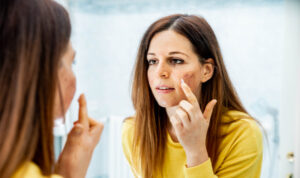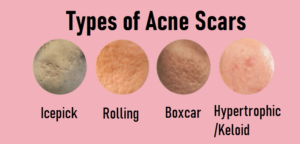Dealing with acne is already frustrating, and getting the scars caused by it can be troublesome for many. If you are going through the same skin condition and thinking this would be the end of the world, the good news is acne scars are treatable.

However, before starting your treatment, you need to get rid of acne as the new one can form new acne scars and may jeopardize the ongoing treatment. Moreover, if you are concerned about the treatment work of skin types and tones, you are at the right place to seek knowledge.

After consulting with skin specialist Dr. Roopi Khera, who is critically acclaimed as the best doctor for acne scar treatment in Ludhiana. We have come up with this blog to share insights about acne scar treatment.
So, let’s start!
Do Acne Scar Treatment Suits All Skin Types?
Acne scar treatments may vary in effectiveness on different skin types and tones. Some treatments, like laser therapy or chemical peels, may be suitable for various skin tones, while others, such as certain types of laser, may be effective for specific skin types. Therefore, it is essential to consult with a dermatologist to determine the most suitable treatment based on your skin. Read to know what methods are used to correct acne scars on various skin types, but before that, let’s try to know what type of acne scars are present.
Types of Acne Scars

Atrophic or Depressed Acne Scars
These are the most common ones to appear on the face. A depressed scar sits below your surrounding skin. They usually develop when there is a lack of collagen during wound healing.
There are three types of atrophic scars:
- Boxcar- These are identified as wide, box-shaped scars with sharp edges. They are commonly formed on the lower cheeks and jaw as your skin is relatively thick.
- Ice Pick- These are generally wide from the top and narrow from the bottom. These V-shaped scars can affect your skin profoundly; hence, they require aggressive treatment.
- Rolling- These give your skin a wavy appearance with round, sloppy edges.
Hypertrophic Scars
These are commonly formed on your chest, back and shoulders. People with dark skin tones are more likely to get these scars.
Why Do You Get Acne Scars?
A common saying goes that touching can lead to scarring, while the acne healing can be affected when you feel it. The main reason behind scarring can be when you leave acne untreated for a long time. Usually, the severity of the scar depends on the cause of the acne.
Moreover, when the acne is not treated on time, it penetrates your skin deeply and damages the tissue beneath it. When the acne clears, your body tries to repair the damage caused. During this process, the body produces collagen, and the formation of scars depends on the amount of collagen produced.
How Can Acne Scars Be Prevented?
After identifying the type of scar, you can start to take vital steps to prevent them and the steps you can take are:
- Make sure you wear sunscreen
- Do not pop pimples
- Stay moisturized
- Treat your breakouts.
When To Consult A Skin-Specialist?
You should seek medical treatment for acne scars when they are immature. Immature acne scars are red and consist of an ample amount of blood supply to heal well. The more mature they become or appear in white, the harder they get to treat.
Treatment Methods For Acne Scars Removal
- Ablative laser resurfacing- It removes the skin’s outermost layer and treats deep acne scars. They remove dark pigmentation and boost collagen production that make the skin look radiant and clear
- Non-ablative laser resurfacing- It heats the cells in dermal layers to help them produce new collagen. This helps make the skin even toned and scar free.
- Microneedling- Microneedling for acne scars uses tiny needles to create minor skin injuries. This stimulates the skin to produce collagen, helping to reduce the appearance of scars. The procedure is safe for different skin types and is done by professionals. Multiple sessions may be needed for the best results.
- Chemical Peels- Chemical peels for acne scars work by applying a unique solution to your skin. This solution helps remove the old, damaged skin layer, revealing fresher skin. It can improve the texture, reduce pigmentation, and make scars less noticeable. The strength of the peel can be adjusted based on your needs. It’s a safe and effective procedure when done by a professional. Multiple sessions may be needed for the best results.
- Other treatment options- If you spend most of your time indoors and have time but a tight budget, consider laser resurfacing, TCA Cross, or chemical peels. If you’re busy indoors with less time for recovery and no urgent need for results, try microneedling, non-ablative laser resurfacing, PRP, or GFC therapy. If you’re on a tight schedule and want fast results, go for dermal fillers or threads.
Get Acne Scars Treatment from Expert
Acne scars may improve over time, but they are permanent, and you can not get rid of them unless a medical treatment treats them. Consulting a dermatologist may help you determine what treatment suits you the best.

If you are seeking effective treatment from an expert, you can get in touch with a skin doctor in Ludhiana, Dr Roopi Khera at Glo Medispa Skin Clinic. Known to be the best, she has treated thousands of patients suffering from stubborn acne and acne scars.
To revamp your skin health, book your appointment with her today!




